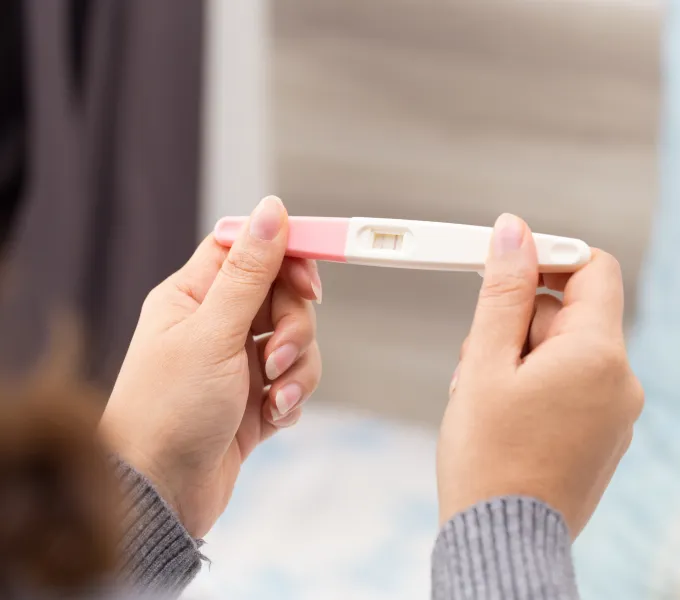
Ovarian Aging: What It Is, Why It Matters, and What You Can Do About It
Here’s a stat that might surprise you: For the first time in U.S. history, more people over 40 are giving birth than teenagers, according to a recent report from the CDC. It’s a cultural shift that shows big changes in how and when we think about starting a family. But while society is evolving, our biology still plays by its own rules. In particular, the ovaries follow a timeline that’s often out of sync with the rest of your body.
That’s where ovarian aging comes in. You might not notice it happening the way you notice a stiff neck or fine lines in the mirror, but the changes are real — and they start earlier than most of us realize. Ovarian aging refers to the gradual decline in the number and quality of eggs over time, and it can affect everything from your fertility and hormone balance to your pelvic floor function.
Read on to learn more about what ovarian aging actually is, why it matters even if you’re not planning to get pregnant anytime soon, and what you can do to support your reproductive health and pelvic floor as you age, including the role of exercise, diet, and pelvic floor therapy.
What is Ovarian Aging?
Ovarian aging refers to, well, your ovaries getting older. But what exactly does that mean?
Ovarian aging refers to the natural decline in both the quantity and quality of your eggs as you get older. This process starts before you’re even born and gets faster as you age, eventually leading to menopause.
“When we talk about aging, there are different timelines,” explained Ashley Rawlins, PT, DPT, a physical therapist specializing in women’s health. “Chronological age increases with each birthday, but your reproductive age follows its own schedule — and for people born with a uterus, the ovaries drive that timeline.”
At birth, the ovaries have about 1 to 2 million immature eggs (called oocytes), stored in tiny sacs called primordial follicles. By puberty, that number drops to about 400,000 to 500,000. After menstruations begins, roughly 1,000 follicles are lost each month. This decline speeds up in your mid-30s, with a sharper decline after age 37.
Ovarian reserve and menopause
The shrinking number of eggs over time is referred to as a decline in ovarian reserve. It’s often what people often mean when they talk about a “ticking biological clock.” But it’s not just about quantity — egg quality also decreases with age.
As ovarian reserve drops, so do estrogen levels. ”Our body’s main source of estrogen is the ovarian follicles,” Rawlins said. “So as we run out of follicles, we also start making less estrogen.” This hormonal shift doesn’t just affect fertility — it influences your whole body.
This hormone shift is what leads to perimenopause, and it usually begins in your early 40s (though it can start earlier or later, depending on things like genetics, lifestyle, and other health factors). This is your body’s gradual transition toward menopause, as your reproductive system begins to wind down.
What are the signs of ovarian aging?
Ovarian aging isn’t always obvious at first. Often, the earliest sign is reduced fertility — which may go unnoticed if you’re not trying to get pregnant. As estrogen levels continue to drop, more noticeable symptoms happen (and these are the symptoms of perimenopause):
- Changes to your period: Your periods may become lighter, heavier, or more irregular than usual, with longer or shorter cycles from month to month, Rawlins said. In other words, your periods become less and less predictable.
- Vasomotor symptoms: This is the fancy term for hot flashes and night sweats, which are triggered by hormone fluctuations, said Rawlins.
- Sleep difficulties: Research shows that almost half of folks in perimenopause will have sleep difficulties. Hot flashes and night sweats can make it even harder to get good, quality sleep.
- Mood fluctuations: Irritability, anxiety, and mood swings can happen. The risk of developing depression is also two to five times higher during this transition.
- Vaginal changes and sexual dysfunction: Lower estrogen can lead to vaginal dryness, decreased elasticity, thinning tissues, and pain during sex. You may also notice a drop in libido (sex drive) or trouble reaching orgasm (a condition known as anorgasmia or female orgasmic disorder).
Can you delay aging of the ovaries?
“First and foremost, you can't outsmart biology,” Rawlins said.
“Aging and menopause happen and are natural processes — but researchers are learning more about ways to support ovarian health and slow aging.”
While there’s no magic solution, some lifestyle choices may help delay certain aspects of ovarian aging.
Regular exercise
Regular exercise is one of the best ways to support your overall health — and that can have positive effects on your reproductive health as well, said Rawlins. “Moderate, regular exercise helps lower the oxidative stress throughout the body. This may help protect your ovarian cells from damage, too,” she said. Exercise is especially beneficial for women with PCOS. Although exercise isn’t guaranteed to help slow ovarian aging, it can make a big difference in your overall health.
Quit smoking
If you needed another reason to quit smoking, here it is. Research shows a link between decreased ovarian reserve and heavy, long-term smoking. Plus there’s a correlation between being a heavy smoker and early menopause. The earlier you can quit, the better.
Eat a nutrient-rich diet
A balanced diet that includes plenty of antioxidant-rich foods can support cellular health, including in the ovaries. If you are concerned about fertility, you can also focus on a diet that supports fertility. Research suggests that foods with omega-3 fatty acids, folic acid, and even soy may help support your fertility.
Are there medical treatments to slow ovarian aging?
Researchers are exploring potential ways to keep your ovaries healthy and delay ovarian aging. Here are some possible treatments that are being studied.
Antioxidant supplements
Oxidative stress — when there's an imbalance between free radicals (unstable molecules that can damage cells) and antioxidants (which neutralize them) in your body — is thought to contribute to ovarian aging.
You may be able to combat some oxidative stress with antioxidants, but it’s still unclear how much this actually affects ovarian aging, Rawlins said. Animal studies have shown that antioxidants like melatonin and CoQ10 may help delay ovarian aging. Some human studies have also shown some benefit. Research in women undergoing in vitro fertilization (IVF) found that certain antioxidants could help boost certain markers of fertility. But more research is needed to confirm whether these benefits could apply more broadly to humans outside of a clinical setting.
Regardless, including antioxidant-rich foods in your diet can support your overall health. If you're considering supplements, be sure to talk to your healthcare provider first.
Metformin
You may know metformin as a medication commonly used to help manage Type 2 diabetes. Researchers are also studying its potential role in reproductive health. In animal studies, metformin has shown promise in delaying ovarian aging in mice. But there isn’t any research to show the same effect in humans.
That said, metformin is already used off-label to support fertility in people with polycystic ovarian syndrome (PCOS). Some research shows the medication may help regulate blood sugar levels, improve hormone imbalances, and support more regular menstrual cycles for these folks — all which can impact fertility.
Rapamycin
Rapamycin (sirolimus) is an immunosuppressant that’s usually used to prevent organ transplant rejection. Outside of this use, scientists have studied its effects on ovarian aging in mice, where it has been shown to slow ovarian aging. Now, a clinical trial is underway to see if low doses of rapamycin can have similar effects in humans. Preliminary results are promising, showing that rapamycin may slow ovarian aging by 20%. Depending on the results of the clinical trial, this could be a promising option for those looking to preserve their ovarian function longer.
How to check your ovarian reserve
If you’re in your 30s and you’re concerned about your reproductive timeline, there are different blood and imaging tests that your healthcare provider can use to help you check in on your ovarian health. Here are some common medical tests:
- Anti-müllerian hormone (AMH): This is a blood test that measures hormone levels to estimate egg supply.
- Follicle-stimulating hormone (FSH) and estradiol: These are blood tests that are usually done around day 3 of your period to assess ovarian function.
- Antral follicle count (AFC): This is a transvaginal ultrasound imaging test that’s done early in your menstrual cycle to count visible follicles in your ovaries.
While your healthcare provider can use these tests to estimate your ovarian reserve, they can’t assess egg quality or predict your exact fertility outcomes. Your OB-GYN or fertility specialist can provide you with guidance for the next steps.
How ovarian aging affects your pelvic floor
Declining estrogen levels don’t just affect fertility — they can also impact the pelvic floor, a group of muscles that support your bladder, bowel, and reproductive organs.
As your ovaries age and estrogen drops, you may notice:
- Pelvic floor muscle weakening (atrophy), affecting muscle support and function
- Tissue changes, like reduced elasticity or blood flow
- Urinary symptoms, like bladder urgency, frequency, and even leakage (incontinence) can become more common
- Bowel changes, including constipation or accidental leakage
- Pain during sex, due to dryness or pelvic floor dysfunction
Fortunately, pelvic floor physical therapy can address these issues. A trained physical therapist can help relieve pain, improve muscle function and bowel and bladder control, and help you restore confidence in your body.
How Origin Physical Therapy can help
Ovarian aging may be a natural part of life — but that doesn’t mean you have to go through it without support. From shifting hormones and fertility changes to sleep issues and pelvic floor symptoms, it’s totally valid to feel overwhelmed. But you don’t have to navigate it alone, and there are ways to feel better in your body.
If pelvic floor symptoms like bladder changes, discomfort during sex, or bowel issues are showing up, pelvic floor physical therapy can make a real difference. At Origin, our expert team of physical therapists understand the complexity of these symptoms and the emotional weight they can carry. We offer personalized, evidence-based care in a safe, inclusive environment — available both virtually and at our clinics across the country. Whenever you’re ready, we’re here to help — book a visit with us to get started.




